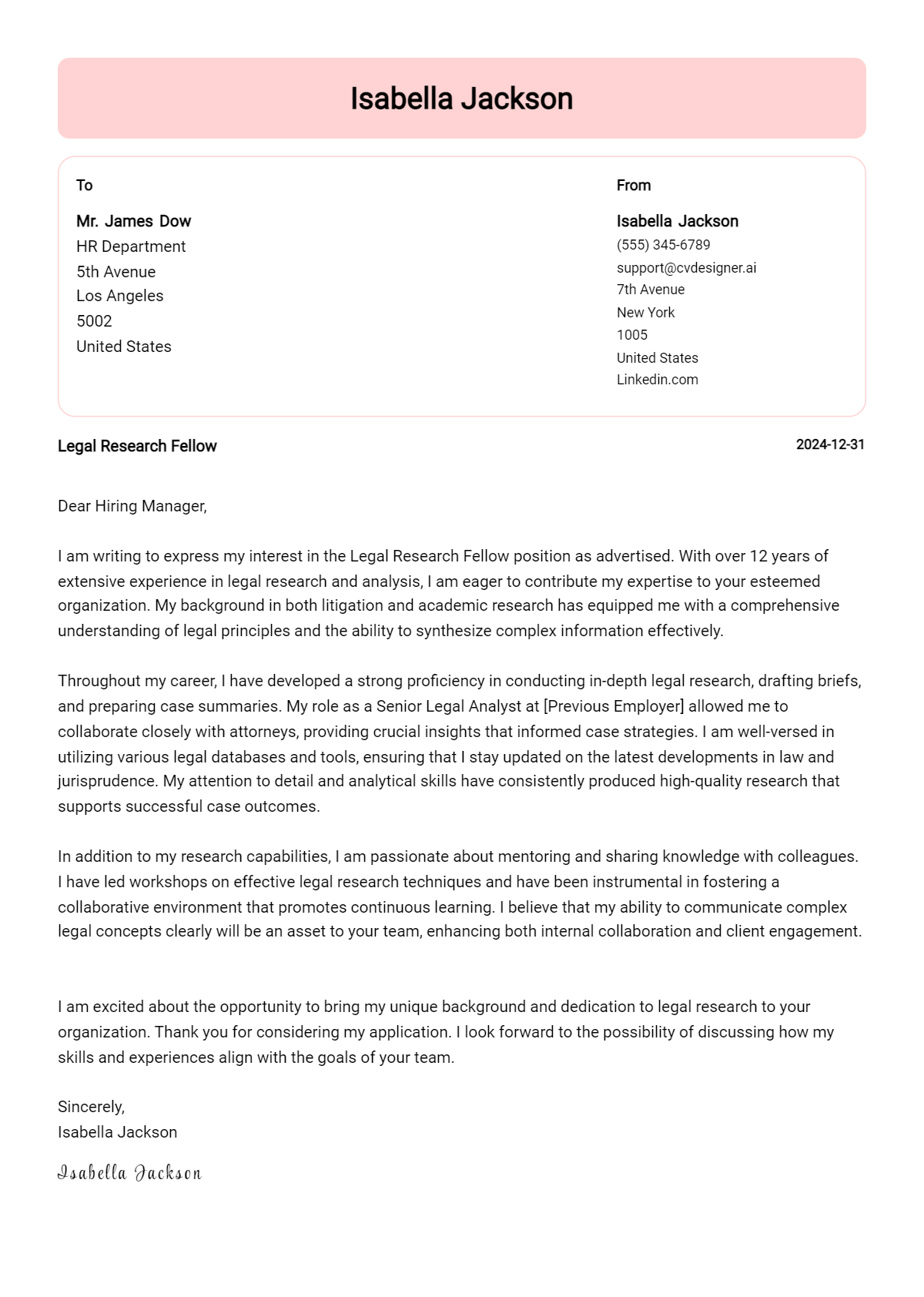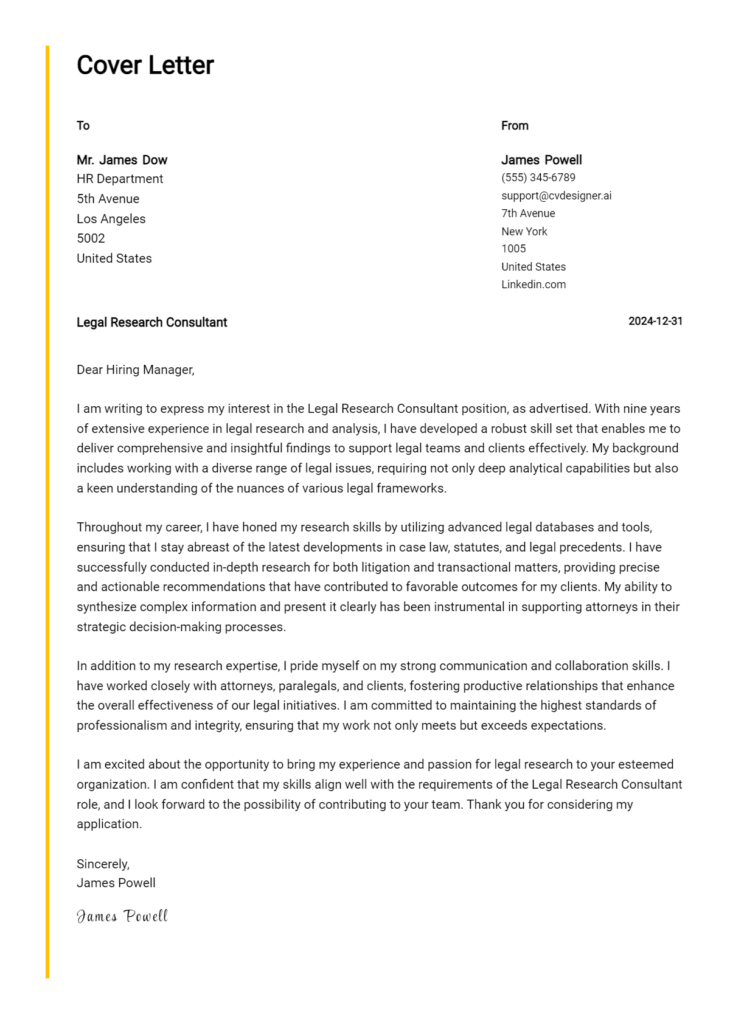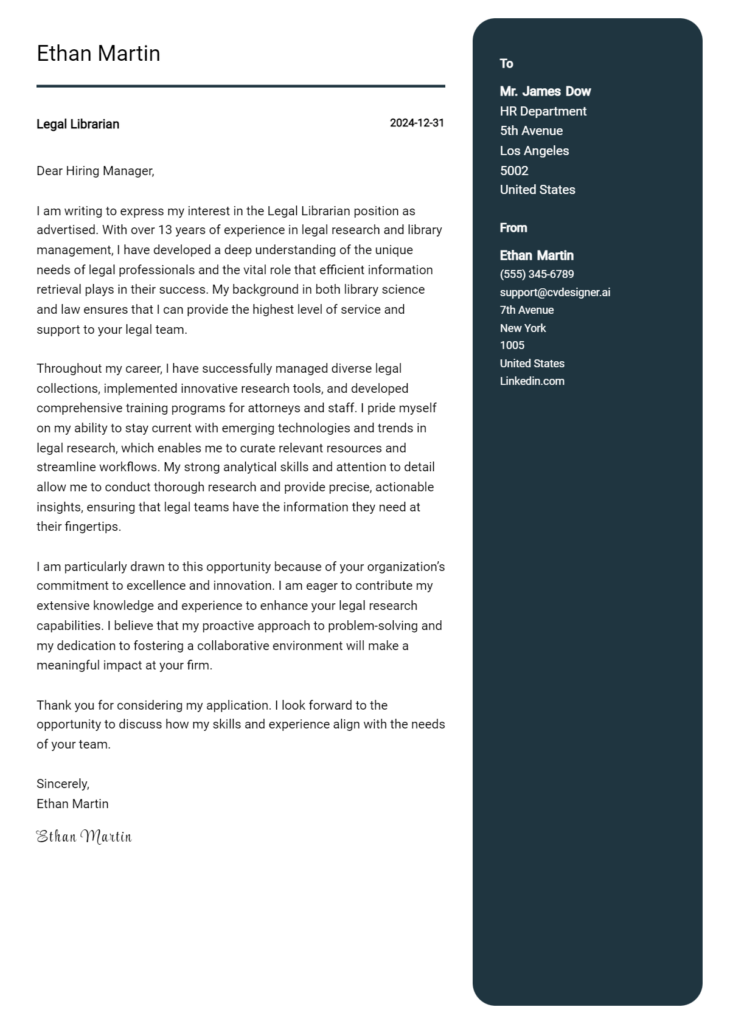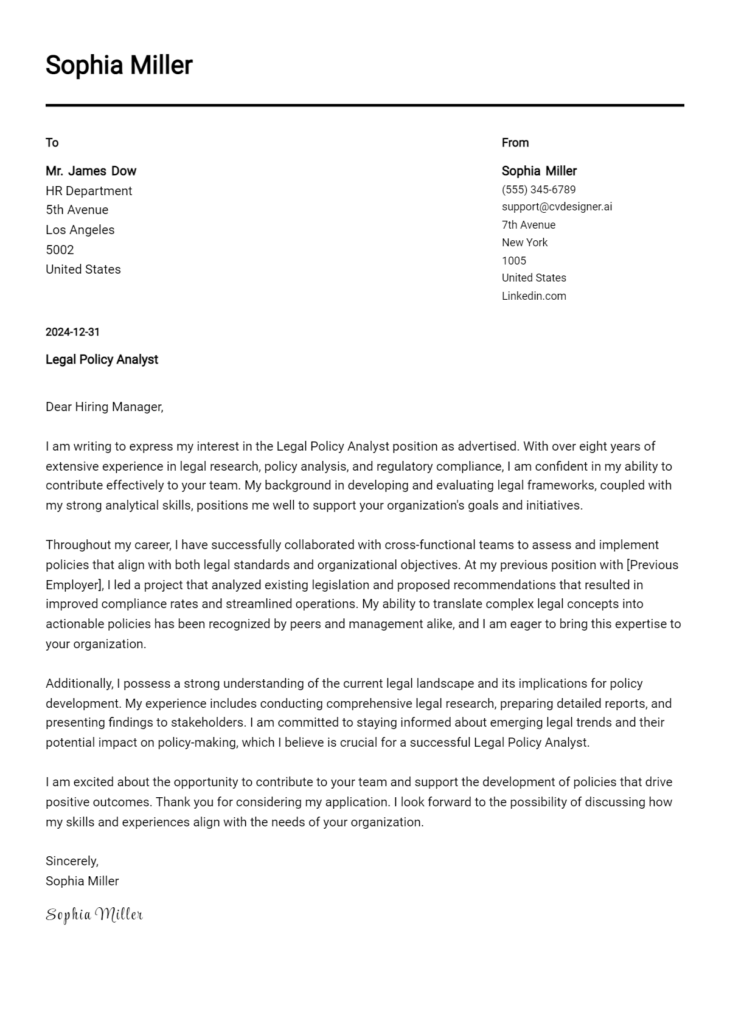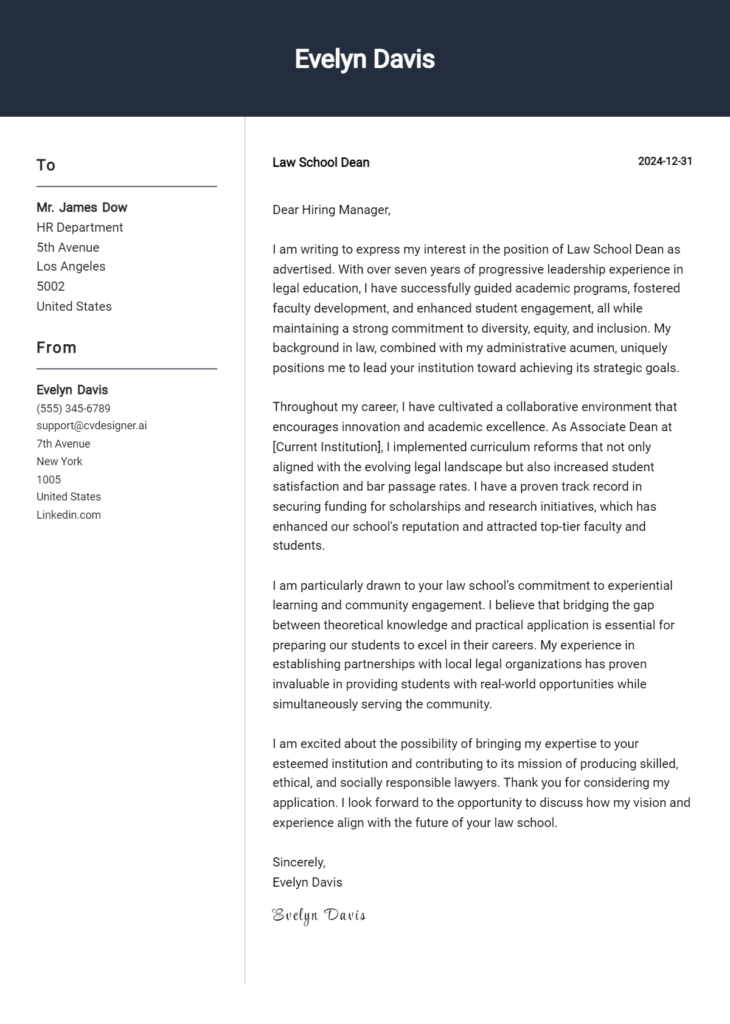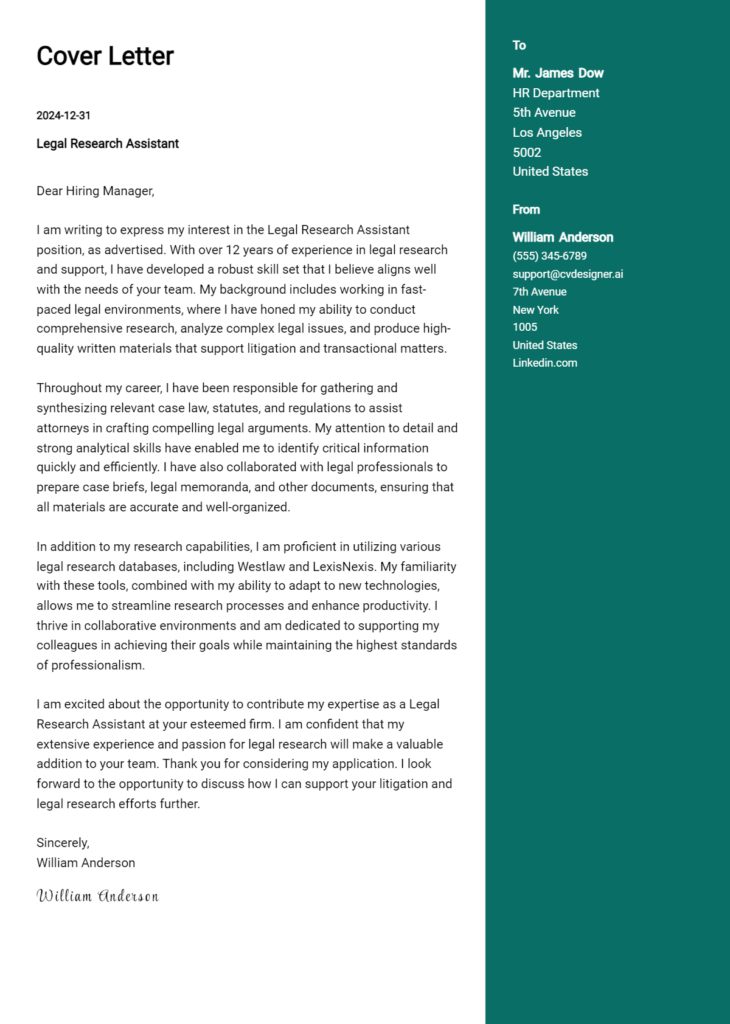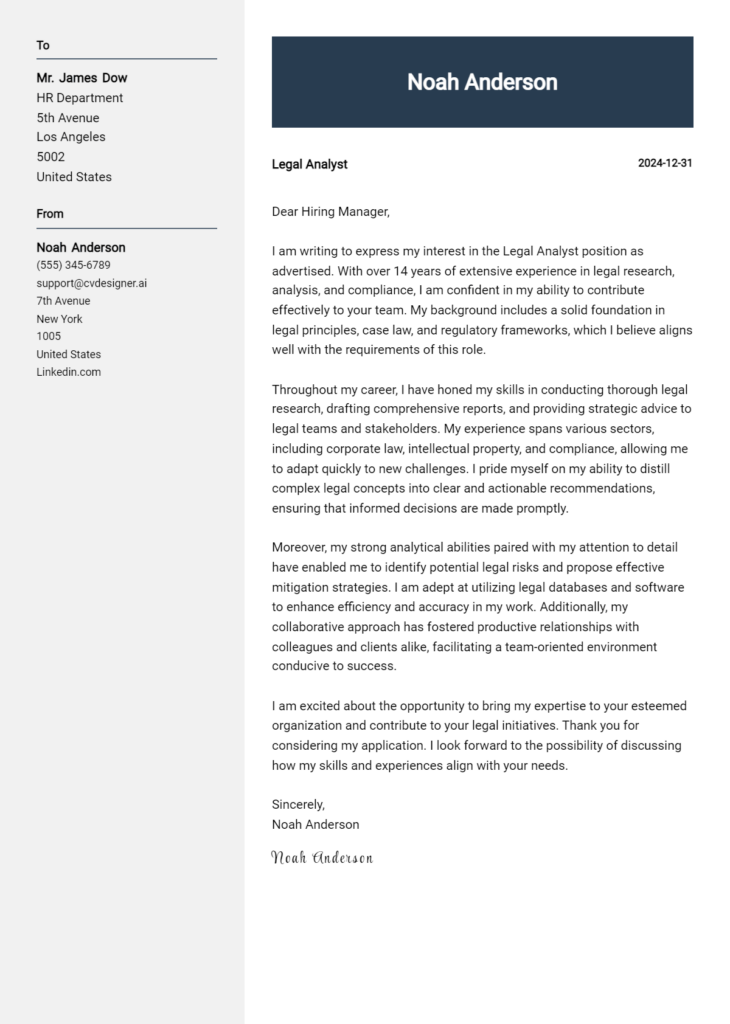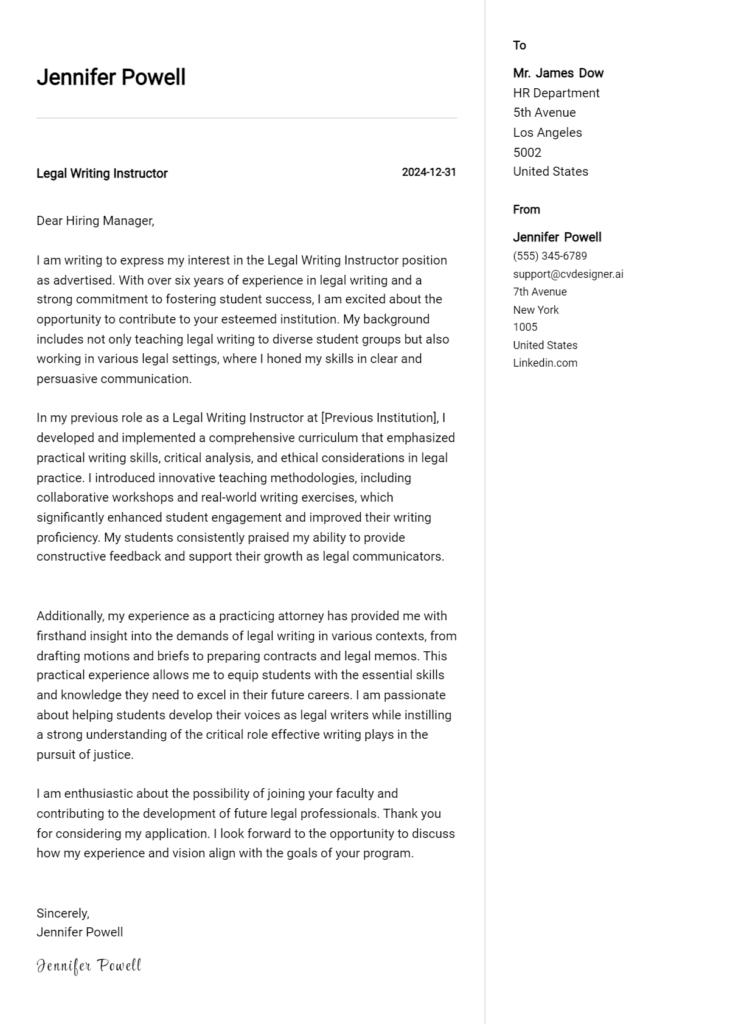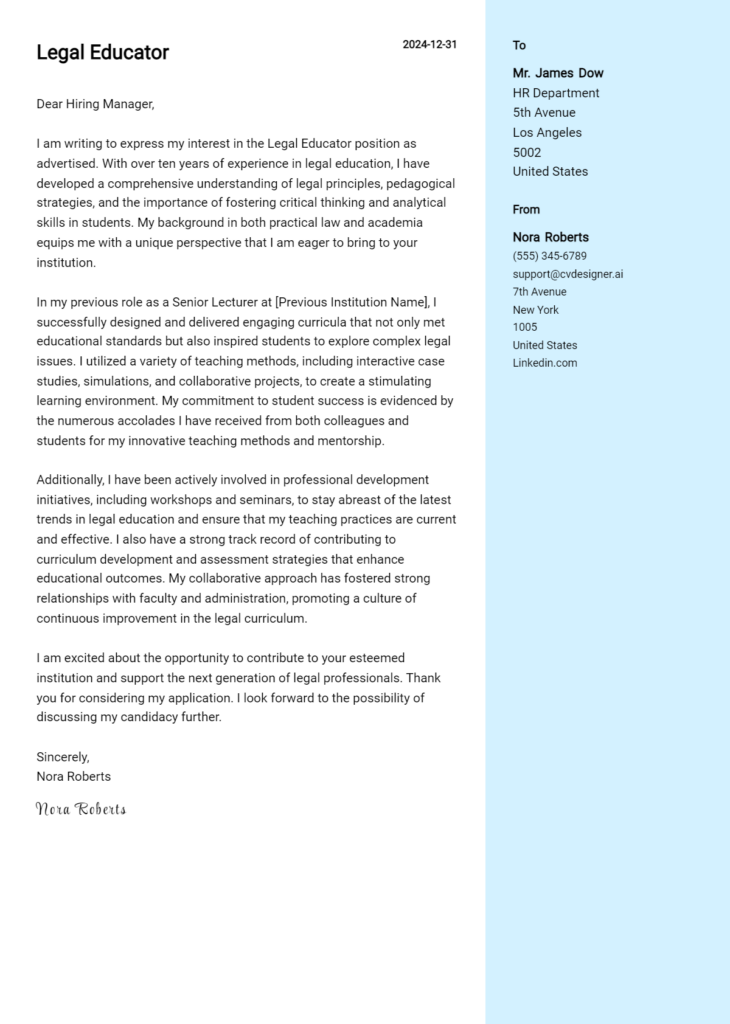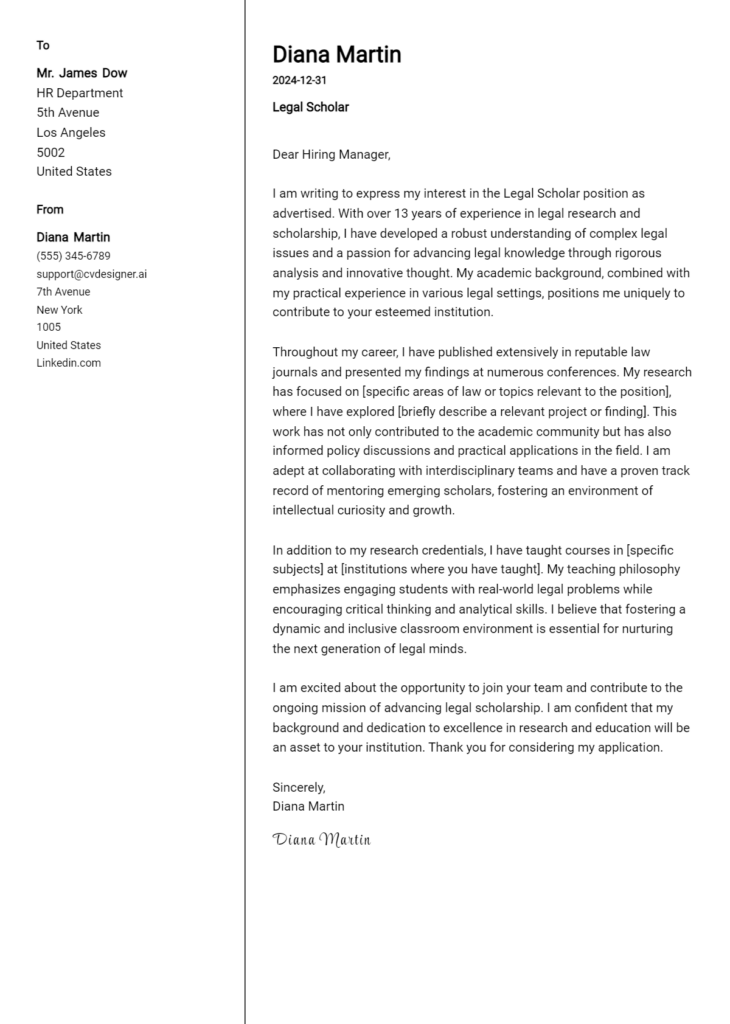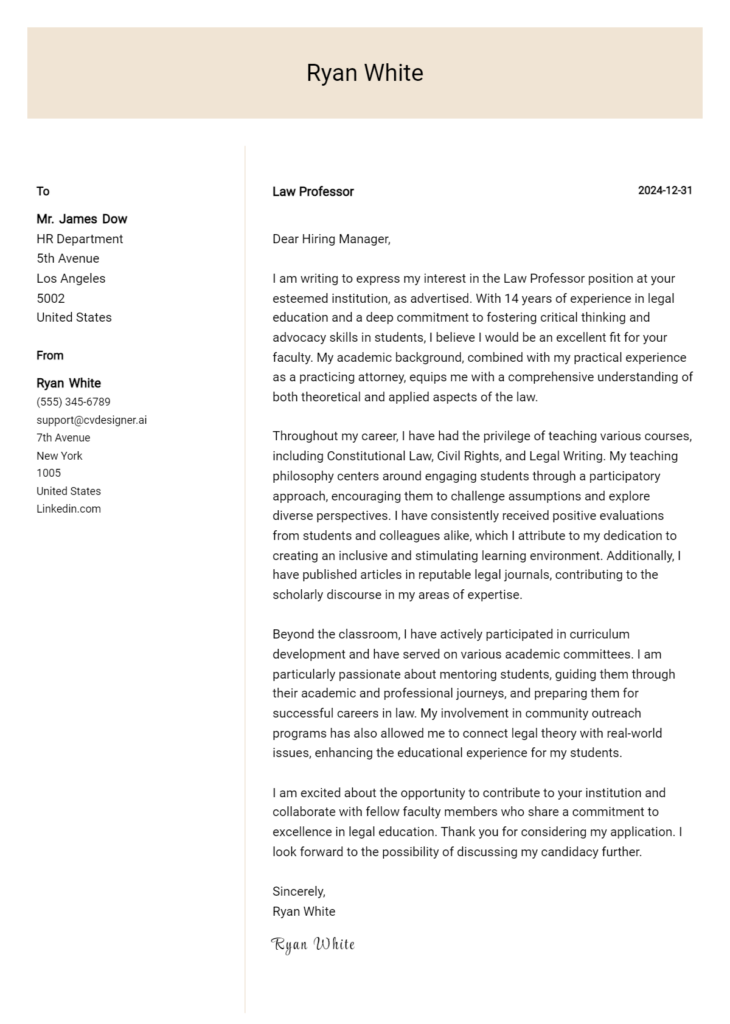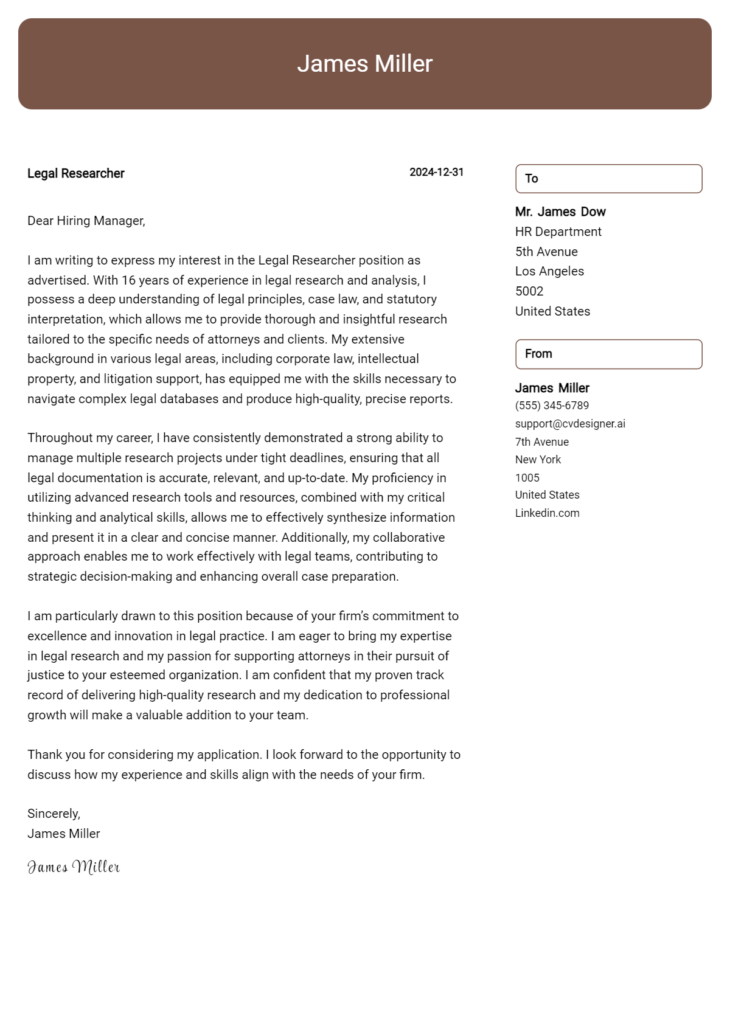Legal Research Fellow Cover Letter Examples
Explore additional Legal Research Fellow cover letter samples and guides and see what works for your level of experience or role.
How to Format a Legal Research Fellow Cover Letter?
Crafting a compelling cover letter for a Legal Research Fellow position is essential, as it serves as your first opportunity to showcase your analytical skills and meticulous attention to detail. Proper formatting not only enhances readability but also reflects your professionalism and organizational abilities—traits that are critical in the legal field. A well-structured cover letter can effectively capture the hiring manager's attention, allowing you to present your qualifications in a clear and persuasive manner.
In this guide, we'll outline the key components of a professional cover letter, including:
- Cover Letter Header
- Cover Letter Greeting
- Cover Letter Introduction
- Cover Letter Body
- Cover Letter Closing
Each section is crucial for effectively communicating your qualifications and enthusiasm for the role. Let’s delve into each part to help you create a standout cover letter tailored for a Legal Research Fellow position.
Importance of the Cover Letter Header for a Legal Research Fellow
The cover letter header is a crucial component of your application as a Legal Research Fellow, as it sets the tone for your entire letter and provides essential information at a glance. A well-structured header enhances clarity and professionalism, making it easier for the recipient to identify your details and contact information. It should include your name, address, phone number, email, the date, and the recipient's details (e.g., name, title, organization, and address). A strong header not only makes a good first impression but also demonstrates your attention to detail and organizational skills, which are vital in the legal field.
Strong Example
John Doe 123 Legal Lane Lawtown, NY 12345 (123) 456-7890 john.doe@email.com October 10, 2023 Jane Smith Head of Recruitment Law Firm XYZ 456 Justice Ave Lawtown, NY 12345
Weak Example
John 123 St 10/10/23 Jane XYZ Law
The Importance of the Cover Letter Greeting
The greeting of your cover letter serves as the first impression for potential employers, setting the tone for the rest of the letter. A well-crafted greeting demonstrates professionalism and shows that you have taken the time to personalize your application by addressing the hiring manager directly. This can create a connection and engage the reader right from the start. To make your greeting stand out, avoid generic phrases like "To Whom It May Concern." Instead, invest some time in researching the recipient's name and title, which can often be found on the company's website or through professional networking platforms. A personalized greeting reflects your genuine interest in the position and respect for the recipient.
Strong Greeting Example
Dear Ms. Johnson,
Weak Greeting Example
To Whom It May Concern,
The Importance of a Strong Cover Letter Introduction for a Legal Research Fellow
A well-crafted cover letter introduction is crucial for a Legal Research Fellow position, as it serves as the first impression to the hiring manager. This initial paragraph should not only capture attention but also convey the candidate's genuine interest in the role. Additionally, it should briefly highlight key skills or noteworthy achievements relevant to legal research. A strong introduction can set the tone for the rest of the application, making it imperative to strike the right balance between professionalism and personality. Below are examples of both strong and weak cover letter introductions for this role.
Strong Example
Dear [Hiring Manager's Name], I am excited to apply for the Legal Research Fellow position at [Organization Name], as advertised on [where you found the job listing]. With a Master’s degree in Law and over two years of experience conducting in-depth legal research for [Previous Employer/University], I have honed my ability to analyze complex legal issues and produce clear, concise reports. My passion for legal scholarship and commitment to rigorous research align perfectly with [Organization Name]'s mission to [insert relevant mission or goal], making this opportunity particularly appealing to me.
Weak Example
To whom it may concern, I am applying for the Legal Research Fellow job because it seems interesting. I have some experience in research and I think I could do well in this position. I hope to learn a lot and contribute to your team.
Purpose of the Cover Letter Body for a Legal Research Fellow
The body of a cover letter for a Legal Research Fellow serves as a critical platform for candidates to articulate their relevant skills, experiences, and the unique value they bring to the organization. It highlights specific projects or accomplishments that demonstrate the candidate's ability to conduct thorough legal research, analyze complex legal issues, and contribute effectively to the legal team. By providing concrete examples of past work, such as successful research projects or publications, candidates can showcase their expertise and commitment to the field, ultimately making a compelling case for their candidacy.
Strong Example
Dear [Hiring Manager's Name], I am excited to apply for the Legal Research Fellow position at [Company Name]. During my recent internship at [Previous Organization], I successfully led a comprehensive research project on intellectual property law, which culminated in a published paper in the Journal of Law and Technology. This experience not only honed my abilities in legal analysis and writing but also provided me with a deeper understanding of the implications of emerging technologies on existing legal frameworks. Furthermore, my collaboration with a team of attorneys to develop case strategies based on my findings has equipped me with practical insights into the application of legal research in real-world scenarios. I am eager to bring this expertise to [Company Name] and contribute to ongoing projects that require meticulous legal scrutiny and innovative solutions. Sincerely, [Your Name]
Weak Example
Dear [Hiring Manager's Name], I am writing to express my interest in the Legal Research Fellow position at [Company Name]. I have done some legal research in the past and have a strong interest in law. I believe I would be a good fit for the team. I once worked on a project in school, where I looked up some cases, and I think that experience would help me in this job. I am eager to learn more and contribute to the team. Best, [Your Name]
Importance of the Cover Letter Closing for a Legal Research Fellow
The closing paragraph of a cover letter is a crucial element that leaves a lasting impression on potential employers. It serves to summarize the candidate's qualifications, reiterate their enthusiasm for the position, and encourage the hiring manager to take the next steps, such as reviewing their resume or scheduling an interview. A strong closing can effectively convey confidence and eagerness, while a weak closing may lead to missed opportunities.
Strong Example
Thank you for considering my application for the Legal Research Fellow position. With my extensive background in legal research and my passion for advancing justice, I am excited about the opportunity to contribute to your esteemed organization. I believe my skills in analytical thinking and my attention to detail will make me a valuable asset to your team. I look forward to the possibility of discussing my application further and am eager to provide any additional information needed. Please feel free to contact me to schedule an interview at your convenience.
Weak Example
I hope you look at my resume. I think I would be fine for the Legal Research Fellow job. Let me know if you want to talk or something. Thanks.
These tips will help candidates craft an effective cover letter for a Legal Research Fellow position, emphasizing the importance of showcasing essential skills and qualities. A well-structured cover letter not only highlights your technical skills and problem-solving abilities but also demonstrates your understanding of the Software Development Life Cycle (SDLC), teamwork capability, and passion for continuous learning. By effectively communicating these attributes, you increase your chances of making a strong impression on potential employers.
Tips for Crafting an Effective Cover Letter for a Legal Research Fellow
Highlight Relevant Technical Skills: Start your cover letter by clearly stating your technical skills relevant to legal research. Mention any familiarity with legal databases, research tools, or software that can support your role. This establishes your competency from the outset.
Demonstrate Problem-Solving Abilities: Use specific examples from your academic or professional experience where you've successfully tackled complex legal issues. Describe the challenges you faced and how your analytical skills led to effective solutions, showcasing your critical thinking.
Showcase SDLC Knowledge: If applicable, discuss how your understanding of the Software Development Life Cycle can benefit legal research projects. Explain how you can apply this knowledge to streamline processes, ensuring that research is thorough and efficient.
Emphasize Teamwork and Collaboration: Legal research often requires collaboration with other professionals. Share experiences that demonstrate your ability to work effectively in teams, highlighting your communication skills and how you contribute to group efforts for successful outcomes.
Convey a Passion for Continuous Learning: In the ever-evolving field of law, a commitment to ongoing education is vital. Mention any recent courses, certifications, or workshops you’ve undertaken to stay updated on legal trends and research methodologies. This not only reflects your enthusiasm but also your dedication to professional growth.
By following these tips and utilizing resources like cover letter templates or a cover letter builder, you can create a compelling cover letter that effectively showcases your qualifications for a Legal Research Fellow position.
Common Mistakes to Avoid in a Legal Research Fellow Cover Letter
Crafting a compelling cover letter is essential for securing a position as a Legal Research Fellow. Avoiding common mistakes can significantly enhance your chances of making a positive impression. Here are several pitfalls to watch out for:
Generic Content: Using a one-size-fits-all approach can diminish your application’s impact. Tailor your letter to the specific fellowship by referencing the organization and its values.
Lack of Specificity: Failing to mention relevant experiences or skills can make your letter forgettable. Highlight specific research projects or legal topics you've worked on to demonstrate your expertise.
Ignoring Formatting Guidelines: Not adhering to proper cover letter format can make your letter look unprofessional. Use a clean, organized layout that includes your contact information, a formal greeting, and a closing statement.
Overly Formal or Informal Tone: Striking the right tone is crucial. Avoid using overly complex legal jargon or being too casual; aim for a professional yet approachable voice.
Neglecting Proofreading: Spelling and grammatical errors can undermine your credibility. Always proofread your letter or ask someone else to review it before submission to catch any mistakes.
Focusing on What You Want: Instead of emphasizing your needs, concentrate on how you can contribute to the organization. Mention how your skills align with their goals.
Failing to Include a Call to Action: Ending your letter without a clear next step can leave your application feeling incomplete. Express your eagerness for an interview or discussion and indicate your availability.
For inspiration, consider checking out cover letter examples to see how successful candidates effectively present their qualifications.
Cover Letter FAQs for Legal Research Fellow
What should I include in my cover letter for a Legal Research Fellow position?
In your cover letter, you should include your educational background, relevant legal research experience, and any specific skills that align with the position. Start with a strong introduction that conveys your enthusiasm for the role. Highlight your familiarity with legal research tools, your ability to analyze complex legal issues, and any publications or papers you’ve authored. Additionally, mention any internships or volunteer work in legal settings that demonstrate your commitment to the field. Conclude with a summary of how your skills and experiences make you an ideal candidate, and express your eagerness to contribute to the organization.
How can I tailor my cover letter to a specific Legal Research Fellow position?
To tailor your cover letter, carefully review the job description and identify key responsibilities and qualifications. Use specific language from the posting to demonstrate that you understand the role and its requirements. Highlight experiences that directly relate to those responsibilities, such as conducting legal research, drafting memos, or collaborating with legal teams. You can also mention any knowledge of particular areas of law relevant to the position. Personalize your letter by addressing it to the hiring manager and expressing your genuine interest in their organization and its mission, showing that you are invested in the opportunity.
How long should my cover letter be for a Legal Research Fellow role?
Your cover letter should ideally be one page long, typically 3-4 paragraphs. Start with a brief introduction stating the position you’re applying for and where you found the job listing. The body should contain 2-3 paragraphs that detail your qualifications, relevant experiences, and skills, while connecting them to the specific requirements of the role. Keep your writing clear and concise, avoiding unnecessary jargon. End with a strong closing paragraph that reiterates your interest and expresses your desire for an interview. Remember, quality over quantity is key; focus on making a compelling case in the limited space.
What tone should I use in my cover letter for a Legal Research Fellow?
The tone of your cover letter should be professional yet personable. Aim for a balance between formality and enthusiasm. Use clear and concise language, and avoid overly complex sentences or legal jargon that may confuse the reader. Show your passion for legal research and the specific field you’re applying to, but maintain a respectful and courteous tone throughout. Personal anecdotes can help convey your genuine interest, but ensure they remain relevant to the position. Ultimately, your tone should reflect confidence in your abilities while demonstrating that you are a good fit for the organization’s culture.
Build your Cover Letter in minutes
Use an AI-powered cover letter builder and have your letter done in 5 minutes. Just select your template and our software will guide you through the process.

